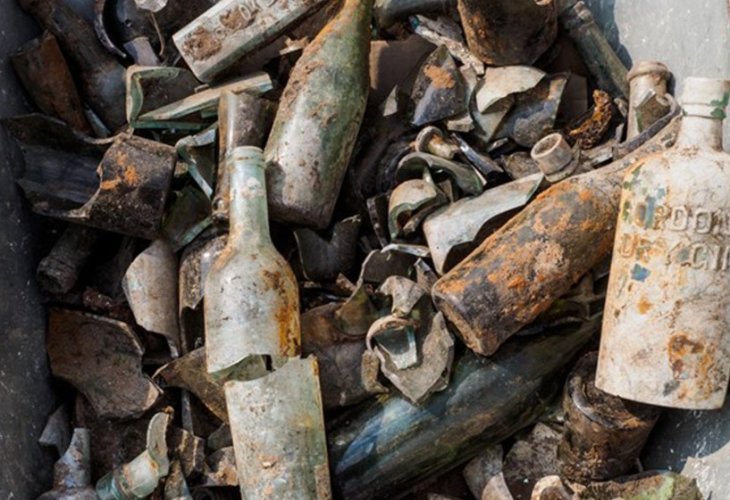World War I Memories Unearthed: A Trove of Soldiers' Bottles Found
Archaeologists near Ramla discover hundreds of soda and spirit bottles from the British Mandate era.
 (Photo: Asaf Peretz, Courtesy of the Israel Antiquities Authority)
(Photo: Asaf Peretz, Courtesy of the Israel Antiquities Authority)During recent archaeological excavations by the Israel Antiquities Authority, archaeologists were surprised to uncover a glimpse into the past from World War I: hundreds of soft drink and alcohol bottles used by British Mandate soldiers were discovered near a building once used by the British army. Alongside the bottles were broken plates, cutlery, uniform buttons, and belt buckles.
Ron Toueg, excavation director on behalf of the Israel Antiquities Authority, shared with Arutz 7 about the find: "We uncovered a building whose upper section did not survive, appearing to be the foundations of a barrack. This structure was used for agricultural purposes in the Ottoman period and was converted by the British during World War I to house soldiers."
Toueg continued to discuss the surprising discoveries: "Inside the building, we found dozens of uniform buttons, belt buckles, and riding gear pieces belonging to British soldiers. The building burned down for reasons not clear at this stage. Just a few meters away, we uncovered where the soldiers discarded their waste. To our surprise, alongside broken plates and cutlery, there was a massive number of beverage bottles. Approximately 70% of the waste dumped into the pit were alcoholic beverages bottles."
"Discovering this site and its findings provides an opportunity to peek into the unwritten part of history and reconstruct for the first time the daily life and leisure activities of the soldiers," he noted.
Brigitte Ouennon, a researcher in the glass department of the Israel Antiquities Authority, states, "This is the first time in the history of archaeology in Israel that a collection of hundreds of glass bottles from a British military camp from World War I has been uncovered. It's fascinating to know that the glass bottles, containing mainly wine, beer, soda, and alcoholic beverages such as gin, liqueur, and whiskey, came from Europe as supplies for the soldiers and officers in the camp."
"This is a rare and first-of-its-kind authentic evidence of the day-to-day military life of the expeditionary soldiers during a very short period in World War I," she added with excitement.
Sherry Mark, an architect, conservator, and researcher of the British army's presence in the Land of Israel, notes, "On November 15, 1917, the Egyptian Expeditionary Force, led by General Allenby, conquered the Lod and Ramla area. Before the conquest of Jerusalem, the army camped in the area where the current archaeological excavation took place." Mark adds that the army stayed there for about nine months, until the decision was made to continue the conquest northward.

